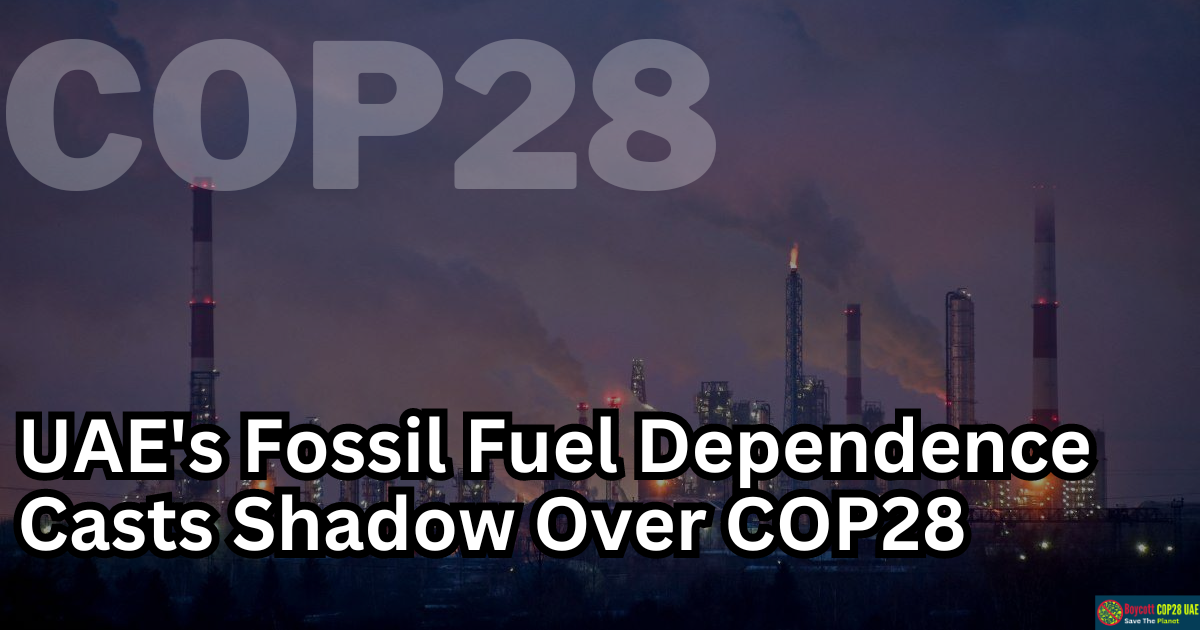With just two months left until the eagerly awaited UN Climate Change summit, COP28, the global debate on fossil fuels is reaching a boiling point. This time, the spotlight falls on the United Arab Emirates (UAE) and its President of COP28, Mr. Sultan Al Jaber, raising serious questions about the country’s commitment to addressing the climate crisis while heavily relying on fossil fuels for economic prosperity.
As leaders, officials, and negotiators from more than 200 nations gear up for COP28, there is a pressing urgency to accelerate emissions reductions. The world eagerly awaits its inaugural “report card” on climate commitments, measuring progress toward the Paris Agreement targets established in 2015. However, beneath the veneer of international cooperation, a deep-seated disagreement looms over the role of coal, oil, and gas in our collective future.
The Paris Agreement and the broader goal of achieving net-zero emissions demand a substantial reduction in fossil fuel consumption. Yet, the precise path to achieve this reduction remains a contentious issue in international negotiations.
Last year, during COP27, more than 80 nations threw their support behind a proposal to phase out all fossil fuels. This initiative, however, faced insurmountable opposition from oil and gas-rich nations, such as Saudi Arabia, which championed carbon capture technology as an alternative solution.
In April of this year, G7 nations reached an agreement to hasten the “phase-out of unabated fossil fuels.” While hailed as progress, the term “unabated” limits the scope of this commitment to those who utilize fossil fuels without employing technology to capture their carbon emissions. Even gatherings of the G20, representing the world’s largest economies, were marred by discord over the issue. Once again, major oil and gas producers, including Saudi Arabia and Russia, resisted a consensus on ending fossil fuel use.
As COP28 approaches in December, it becomes increasingly evident that the thorniest issue facing global leaders and negotiators will be the future of fossil fuels and the role of countries like the UAE, whose reliance on these resources raises eyebrows.
UAE’s Fossil Fuel Dependence Under Scrutiny
The United Arab Emirates, renowned for its opulent skyscrapers and extravagant lifestyle, stands at the crossroads of an international climate crisis. As one of the world’s leading oil and gas exporters, its economy hinges heavily on fossil fuel revenues. This reality raises pertinent questions about the UAE’s commitment to genuine climate action.
At the helm of COP28, Mr. Sultan Al Jaber, a prominent figure in the UAE’s political and economic landscape, faces mounting scrutiny. While the UAE has made strides in renewable energy investments, its continued reliance on fossil fuels as a financial lifeline casts doubt on the sincerity of its climate commitments.
Critics argue that the UAE’s commitment to renewables is more about garnering global praise than addressing the root causes of the climate crisis. Their reliance on fossil fuels contributes to greenhouse gas emissions and perpetuates a global addiction to these finite resources.
President Al Jaber’s Balancing Act
As President of COP28, Mr. Sultan Al Jaber faces a delicate balancing act. On one hand, he represents a nation that derives a substantial portion of its wealth from oil and gas exports. On the other, he presides over a critical global summit tasked with charting a sustainable future and reducing fossil fuel dependence.
The tension between these two roles cannot be ignored. Al Jaber’s leadership of COP28 raises questions about conflicts of interest and the true intentions of the UAE on the climate stage. Is the UAE genuinely committed to weaning itself off fossil fuels and supporting a global transition to sustainable energy, or is it merely seeking to bask in the limelight of COP28 while perpetuating business as usual?
COP28’s Crucial Crossroads
As COP28 approaches, the world awaits answers from the UAE and President Al Jaber. The summit stands at a crucial crossroads, where meaningful action on climate change must transcend political and economic interests. The spotlight on fossil fuels cannot be dimmed, and the UAE’s role in shaping the future of energy will be under intense scrutiny.
The urgency for decisive action cannot be overstated in a world increasingly affected by climate-related disasters, from wildfires to hurricanes. The UN Climate Change Summit is a unique opportunity to shift the trajectory of our planet toward a more sustainable future. However, achieving this goal requires unwavering dedication and a willingness to make difficult choices.






